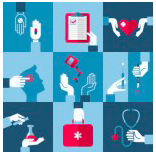CMS Funds Big Data Analytics Projects for Quality Improvement
 The CMS QIO Program has created 28 new SIP awards for innovative projects that use data analytics to improve hospital and care quality while reducing healthcare costs.
The CMS QIO Program has created 28 new SIP awards for innovative projects that use data analytics to improve hospital and care quality while reducing healthcare costs.
The CMS Quality Improvement Organization (QIO) Program has established new funding opportunities for projects that use big data analytics to improve quality of care, reduce healthcare costs, and expand the scale of smaller quality improvement initiatives, stated a recent blog post by CMS.
CMS funds big data analytics projects for quality improvement
The Quality Innovation Network-Quality Improvement Organizations (QIN-QIOs) may work with healthcare providers or partners to compete for one of the 28 Special Innovation Projects (SIP), with grant options totaling $8 million.
SIPs are two year research projects that endeavor to improve care quality and promote partnerships between large healthcare organizations and QIN-QIOs.
"The QIN-QIOs selected to carry out these SIPs will leverage their data-driven approach, extensive partnerships, and the voices of patients and families to positively impact Medicare beneficiaries in their communities and nationwide," wrote Patrick Conway, MD, MSc, in the blog post.
All proposed projects must fall into one of the two SIP categories to qualify.
The first category is "Innovations that Advance Local Efforts for Better Care and Smarter Spending." These projects will identify key healthcare quality issues in specific QIN-QIO regions. Researchers will use big data analytics and evidence-based practices to help local healthcare providers to improve quality care and affordability.
The other category is "Interventions that are Ripe for Spread and Scalability." These initiatives will expand the scale of smaller, successful quality improvement initiatives. Researchers should aim to spread the benefits of smaller projects to the national healthcare community.
The scalability category is modeled on the CMS Strategic Innovation Engine (SIE). The initiative works to quickly transition evidence-based quality improvement practices to implementation using the QIO program.
CMS and SIE Executive Leadership Council are searching for specific ways that QIN-QIOS can improve care for Medicare beneficiaries. They are looking for projects that:
- Streamline patient flow in various health care settings, including hospital units, outpatient clinics, primary care offices, ambulatory surgical centers, and cancer centers resulting in efficiencies, improved satisfaction, decreased mortality, better care, healthier people, and smarter spending.
- Work with health plans and/or care coordination providers to deploy an integrated approach to post-acute care that results in enhanced care management, safe transitions from one care setting to another, improved health outcomes, and reductions in harm.
- Increase value, patient affordability, and appropriate use of specialty drugs by applying evidenced based criteria to prescribing practices and by monitoring effectiveness when providers have a choice(s) among equally effective drugs with differing costs.
- Address acute pain management. For example, more effort is needed to assist sickle cell patients: from accurate identification of their illness to education of emergency department staff on sickle cell disease while addressing the cultural stigmas often associated with the disease.
- Utilize big data analytics to reduce preventable harm in healthcare.
With the new SIP awards, CMS hopes to encourage providers and researchers in the healthcare community to explore partnerships with QIN-QIOs. New partnerships could potentially lead to better ways to share best practices and access data measures.
"Through collaboration with healthcare providers, patients, families, and other key stakeholders, QIN-QIOs have tremendous potential to take those interventions to the national level and improve the health care delivery system by tapping into new settings of care and building upon the knowledge gained by people working on the front line of providing quality health care,' said Conway.
By:Jacqueline Belliveau
Source: http://healthitanalytics.com/









